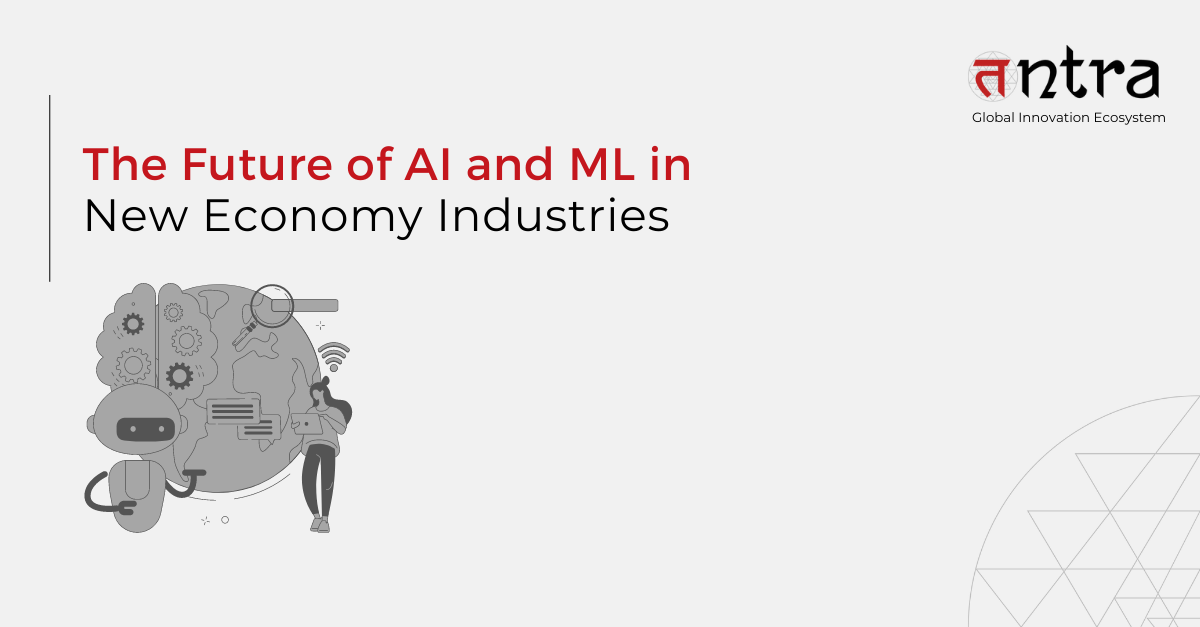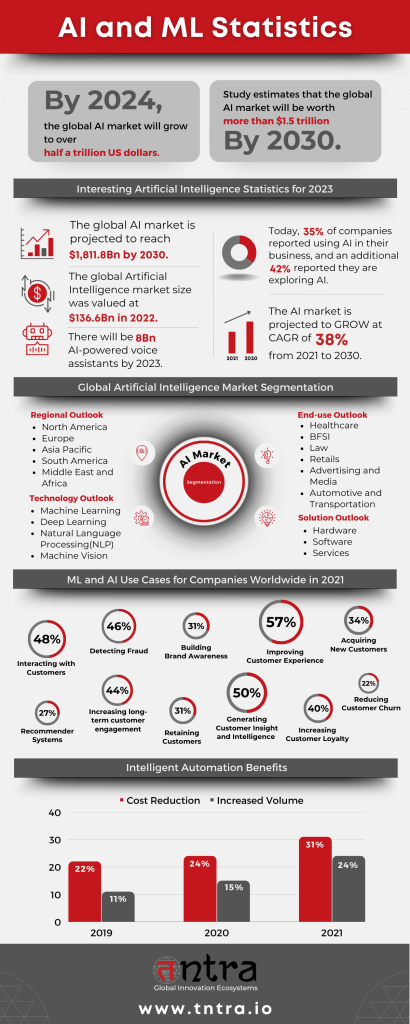
The Future of AI and ML in New Economy Industries
Table of Contents
ToggleAI and machine learning are driving significant transformations across industries, including manufacturing, healthcare, transportation, and customer service. These technologies offer enhanced productivity, innovation, and personalized experiences. As businesses increasingly prioritize AI and ML initiatives, the potential for growth and development is immense. Leveraging technology consulting services, organizations can tap into the power of data-driven decision-making, automation, and tailored solutions to thrive in the new economy. The future holds promising opportunities for AI and ML, paving the way for a dynamic and successful digital landscape.
While gathering a large amount of user data, Starbucks uses AI and machine learning to satisfy the changing needs of its customers. With the launch of its rewards program and mobile app, Starbucks has been able to learn a lot about its customers’ purchase patterns, including their preferred drinks and ordering times. The app promotes customized new beverages and delights and sends specialized offers and discounts outside regular birthday promotions thanks to the digital flywheel program, an AI engine.
Starbucks uses Esri’s Atlas mapping and business intelligence technology in conjunction with data intelligence to decide the locations of its stores. To make recommendations for new locations, Atlas analyzes various data, including demographics, traffic patterns, and proximity to nearby Starbucks outlets. To ensure that strategic development has no unfavorable effects, it even forecasts the potential influence on surrounding retailers that could arise if a new store were to open.
Starbucks improves its customer experience and decision-making processes by efficiently employing AI solutions, machine learning, and data intelligence. Starbucks maintains its position as a market leader by offering tailored recommendations and making strategic expansion decisions, consistently adjusting to client preferences, and streamlining business processes.
Source: Forbes
The Increasing Priority of AI and Machine Learning Initiatives
The global machine learning market grew steadily, reaching $15.44 billion in 2021, driven by the increasing use of technological breakthroughs. The compound annual growth rate (CAGR) estimates a strong increase from $21.17 billion in 2022 to $209.91 billion in 2029, with a noteworthy CAGR of 38.8%.
The potential for corporate growth and development is enormous with Artificial Intelligence (AI). According to a TechJury report, 42% of businesses are actively investigating the deployment of AI, while 35% are already using it. Furthermore, 91.5% of the most successful companies continuously invest in AI. By 2023, Gartner projects that firms utilizing AI will see a 25% improvement in consumer satisfaction.
The use of ML and AI in New Economy sectors is changing how enterprises approach the solutions to their problems. Already 49% of respondents considered AI and ML projects a high priority and 28% claimed AI and ML initiatives were the top priority among other IT projects in their companies in 2021.
ML and AI technology revolutionize problem-solving approaches in different business sectors. In fact, a significant 49% of respondents have recognized AI and ML projects as high-priority endeavors, with an impressive 28% ranking them as the top priority among all IT projects within their companies in 2021. This highlights the increasing significance placed on AI and ML initiatives, reflecting the transformative potential these technologies hold for enterprises seeking innovative solutions to their challenges.

Emerging Trends in New Economy Industries: The Future of AI and ML at the Forefront of Change
We live in the age of a data-driven economy where companies are motivated to make smarter use of data to proactively manage both typical and non-typical business challenges. More and more New Economy industries are driving a high growth trajectory thanks to the implementation of AI and Machine learning.
The future of AI software sales is anticipated to reach about $90 billion by 202 due to AI adoption across industries. Businesses embrace artificial intelligence’s ability to improve judgement and foster holistic intelligence.
- Manufacturing and the Use of AI and ML
- One sector that stands out as being particularly adept at utilizing the full potential of AI and machine learning is the manufacturing business. The use of ML and AI in manufacturing industry leads to major reductions in unplanned downtime, enhanced product design, quicker transition times, higher overall product quality, and increased worker safety.
- AI algorithms are used in predictive maintenance and generative design to produce cost-effective outcomes. The AI can identify problems in the production line, preventing mistakes and preserving the company’s reputation.
- Looking ahead, AI has the potential to further transform the manufacturing sector. With the development of AI and ML technologies, we may anticipate even larger increases in productivity and innovation by automating repetitive tasks, performing predictive maintenance, and optimizing manufacturing processes.
- Use of AI and ML in Information Technology
- Software product engineering services are among the major beneficiaries of AI and ML technology. As per a Harvard Business Review survey, a sizable portion of multinational corporations (between 34 and 44%) are using AI to address staff technical assistance issues, automate system enhancements within the organization, and mandate the usage of technology from approved vendors.
- With organizations depending on AI and ML, their potential in the IT sector is enormous in the future. The sector is expected to enter new spheres of productivity and growth as AI continues to fuel innovation, boost operational effectiveness, and enhance decision-making processes.
- Opportunity for Small Business
- In the future, small businesses will increasingly leverage AI and ML as integral components of their New Economy solutions. AI will enable personalized and targeted marketing efforts, allowing small businesses to reach specific audiences effectively.
- ML algorithms will facilitate data analysis and customer behavior predictions, enhancing decision-making processes. Automation powered by AI will streamline operations, reduce costs, and improve overall efficiency, enabling small businesses to thrive in the competitive market landscape.
- ML and AI in Healthcare
- Future advancements in ML and AI in healthcare in the healthcare sector have the potential to significantly improve several facets of the sector. For instance, these technologies can alter the process of developing drugs, hastening the creation of new medications for fatal illnesses. Another example of AI applications in healthcare is radiology. AI can automate image analysis, resulting in accurate and effective diagnosis while lowering human error.
- A bright and hopeful future for AI and ML in healthcare is predicted as it will support healthcare personnel, lessen their workload, enable remote patient diagnostics, and expand medical facilities to underserved areas.
- ML and AI in Transportation Industry
- The adoption of AI services is driving a huge revolution in the transportation sector. Self-driving cars and trucks, which use AI algorithms to drive and run without human assistance, are transforming transportation.
- AI also makes it possible to manage traffic patterns effectively, predict congestion, and provide real-time traffic updates, which optimizes travel times and improves safety. Additionally, AI supports predictive maintenance and monitoring of vehicle performance. It also helps find cost-effective freight transportation routes and modes, improves the effectiveness of transportation networks, and lowers expenses.
- Future of Customer Service with AI and ML
- Customer service is changing as a result of the helpful assistance that AI and ML are offering with sales questions, risk assessment, and administrative activities. By effectively managing requests and providing prompt responses, these technologies shorten the time spent dealing with customers. Personalization powered by AI helps companies better understand and cater to the requirements and expectations of their customers. By spotting and resolving issues before they come up, AI also makes proactive assistance possible.
- In the future, the use of ML and AI in customer service will continue to improve customer service, delivering more effective and customized experiences for increased customer pleasure. When it comes to integrating and utilizing the advantages of AI and ML in customer service operations, technology consulting services are essential.
Unlock Success with Tntra’s Open Innovation Ecosystem! Discover Winning Solutions Today.
Conclusion
Several industries in the new economy are changing as a result of the development of artificial intelligence (AI) and machine learning (ML). AI and ML are enabling substantial improvements and producing disruptive results in a variety of industries, including manufacturing, healthcare, transportation, and customer service. Businesses have a lot of potential for the future, particularly when combined with the knowledge of technology consulting services.
Organizations may use data-driven decision-making, automation, and tailored experiences to achieve operational excellence, spur innovation, and improve customer happiness as AI usage increases. For enterprises looking to explore and prosper in the digital era, the integration of ML and Artificial intelligence in the New Economy promises a dynamic and attractive terrain.
Are you looking for a software product engineering company to help you with innovative AI solutions?
Contact experts at Tntra today for out-of-the-box problem-solving approaches.





